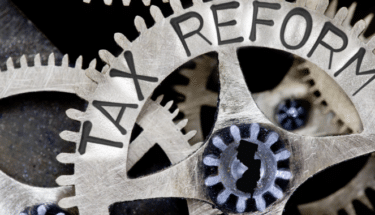Yesterday, Governor Christie delivered his FY 2018 budget proposal. Below is a brief summary that highlights many items important to the business community. For a copy of the “Budget Summary,” please click here. For the text of the Governor’s speech, please click here.
Note: While many of the issues outlined below are referenced throughout the summary, I have provided citations for quick reference.
Here are the highlights of the budget:
FY 2018 Budget — $35.5 Billion
Expected Revenue Growth
Revenue growth is expected to be 3.6 percent or just over $1.2 billion. That includes a 3.6 percent increase in gross income tax revenues to $14.435 billion, 1.7 percent growth in sales tax revenue to $9.451 billion, and 5 percent growth in corporate business tax revenue at $2.595 billion (pg. 32-35).
Tax Relief for Business
The Governor’s proposed FY 2018 budget includes the continuation of a number of positive tax cuts and reforms for New Jersey businesses of all sizes. The following reforms, which began in the FY 2012 budget, fully phased-in and unchanged, now total over $3 billion in savings:
Income/Loss Netting and NOL Carry-Forward, Single Sales Factor, S-Corp Minimum Tax cut of 25 percent from FY 2012 levels, R&D Tax credit, Tech. Business Tax Certificate Transfer Program, Transitional Energy Facilities Assessment Phase-out (pg. 4).
To get more news on Economic Development issues, join NJBIA’s Taxation and Economic Development Issue Network.
Additionally, the FY 2018 budget includes bipartisan tax reforms passed by the Governor and the Legislature in October, which addressed New Jersey’s tax climate and provided substantial investment in the state’s infrastructure by increasing the state’s gas tax. These reforms include a full elimination of the estate tax by January 1, 2018, an increase in the income tax exclusion for pension and retirement income, a reduction in the state sales tax, an increase in the earned income tax credit and an income tax deduction for veterans (pg. 3).
Transportation
The Governor’s FY 2018 budget proposal includes a $2 billion State Transportation Capital Program. The program includes over $1.3 billion for State and local highway and bridge projects, and another $677 million for mass transportation projects. Over the next eight years, this will account for a $16 billion Transportation Trust Fund (TTF) plan, with 100 percent of gas tax revenues constitutionally dedicated to repair and replace New Jersey roads and bridges (pgs. 27-28).
During his remarks, the Governor also called for a $400 million supplemental appropriation in the current fiscal year to address bridge deficiencies and road repairs. He noted that these funds are projected to be spent quickly, over the next 100 days.
Education Funding
While much of the discussion leading up to the budget address focused on school funding, the Governor did not propose any change in the school funding formula. School funding remains essentially flat, as the Governor’s FY 2018 budget proposes spending more than $13.8 billion on education, an increase of $523.2 million from FY 2017. Of the total school aid, almost $9.2 billion represents direct aid to schools, an increase of $16.1 million over FY 2017 (pg. 7).
The Governor also challenged the Legislature, and specifically legislative leadership, to work together over the next 100 days to come up with a new school funding formula. The Governor added that if school funding was not fixed in the next 100 days, it would be fixed before he completes his term as Governor.
Higher Education Funding
The FY 2018 budget proposal maintains higher education funding at a total of $2.2 billion. Funding for Tuition Aid Grants (TAG) will see an increase of $15.7 million over fiscal 2017, for a total of $419.4 million (pg. 17).
Hospitals
The Governor’s budget reduces charity care payments to hospitals by $50 million to a total of $252 million, and increases funding for Graduate Medical Education (GME) by $30 million for a total of $218 million. The Governor’s FY 2018 budget anticipates that the decrease in Charity Care will be offset by insurance payments that hospitals will receive on behalf of residents who now have health care coverage through the expanded NJ FamilyCare program and the federal marketplace (pgs. 18-19).
Partnership to Help Combat Addiction
In yesterday’s budget proposal, Governor Christie proposed creating a unique partnership with Horizon to provide greater access to in-patient and out-patient drug rehabilitation treatment and help New Jersey’s most vulnerable population who access Charity Care and Medicaid. NJBIA is still gathering more information on this proposal and will be evaluating its impact.
Unemployment Insurance Trust Fund Savings
Significant reforms championed by NJBIA, and vigorous monitoring and implementation of anti-fraud measures by the NJ Department of Labor & Workforce Development, have saved taxpayers more than $915 million in improper spending from the Unemployment Insurance Trust Fund. This responsible oversight has restored the solvency of the Trust Fund, now at a positive balance of more than $1.9 billion.
As a result of this positive balance being reached well ahead of schedule, annual, incremental tax rate reductions have occurred, which will save employers more than $1 billion over the next five years (pg. 4).
Pension & Health Benefits
The Governor’s FY 2018 budget includes a $2.5 billion pension payment. This will bring total contributions of the Christie Administration to $8.8 billion, which is more than two-and-a-half times the total contributions of every other governor combined since 1995 (pg. 11).
Additionally, the Governor proposed contributing the revenues from the State Lottery to eligible pension plans. The Governor stated that this transfer of assets has the potential to reduce the unfunded liability and increase stability in New Jersey’s pension system. We look forward to learning more about this initiative and its impact on the pension system.
The FY 2018 budget assumes $125 million in savings from public employee and retiree health care costs through a combination of new reforms to help offset anticipated growth. These include the implementation of changes to contain out-of-network costs, and that the School Employees’ Health Benefits Program (SEHBP) Plan Design Committee will adopt the same cost controls that have been adopted for the State Health Benefits Program (SHBP).
These reforms are projected to reduce local employer and employee costs by an additional $37 million and would additionally save local governments, school districts – and the property taxpayers who fund them – approximately $127 million (pg. 14-16).
The Governor’s FY 2018 Budget also:
- Maintains a surplus of $493 million
- Continues over $1 billion in direct property taxpayer relief programs
- Contains $2 billion less in discretionary spending than the FY 2008 Budget
Agency budgets were changed as follows (page 39): ( ) denotes a decrease
Department/Agency Change
- Agriculture (1.1 percent)
- Banking and Insurance flat
- Children and Families .6 percent
- Community Affairs (1.7 percent)
- Corrections (2.8 percent)
- Education .4 percent
- Environmental Protection (.8 percent)
- Health 9.8 percent
- Human Services 3.1 percent
- Labor and Workforce Development (.2 percent)
- Law and Public Safety (1.9 percent)
- Military and Vet’s Affairs (1.9 percent)
- State .5 percent
- Transportation (1.7 percent)
- Treasury (3.1 percent)
Interfund transfers to the General Fund of note (pgs. 66-67):
- $0 million from the Clean Energy Fund*
- $66.7 million from the Enterprise Zone Assistance fund
- $19 million from the Hazardous Discharge Site Cleanup Fund
- $23 thousand from the Housing Assistance Fund
- $16.9 million from the New Jersey Spill Compensation Fund
- $1 million from Pollution Prevention Fund
- $2.6 million from the Safe Drinking Water Fund
- $38.5 million from the State Disability Benefit Fund
- $1 billion from the State Lottery Fund
- $12 million from the State Recycling Fund
- $2 million from the Supplemental Workforce Fund for Basic Skills
- $160 million from the Unclaimed Personal Property Trust Fund
- $13.3 million from the Unemployment Compensation Auxiliary Fund
- $67.7 million from Universal Service Fund
- $4.4 million from the Water Supply Fund
- $2.8 million from the Worker and Community Right to Know Fund
*$154 million diverted to NJ Transit, state utility costs and park stewardship
Please stay tuned for additional budget-related updates, as I plan to keep everyone informed as the budget process continues. The FY 2018 budget must be passed by the State Legislature and signed into law by the Governor by July 1, 2017.





